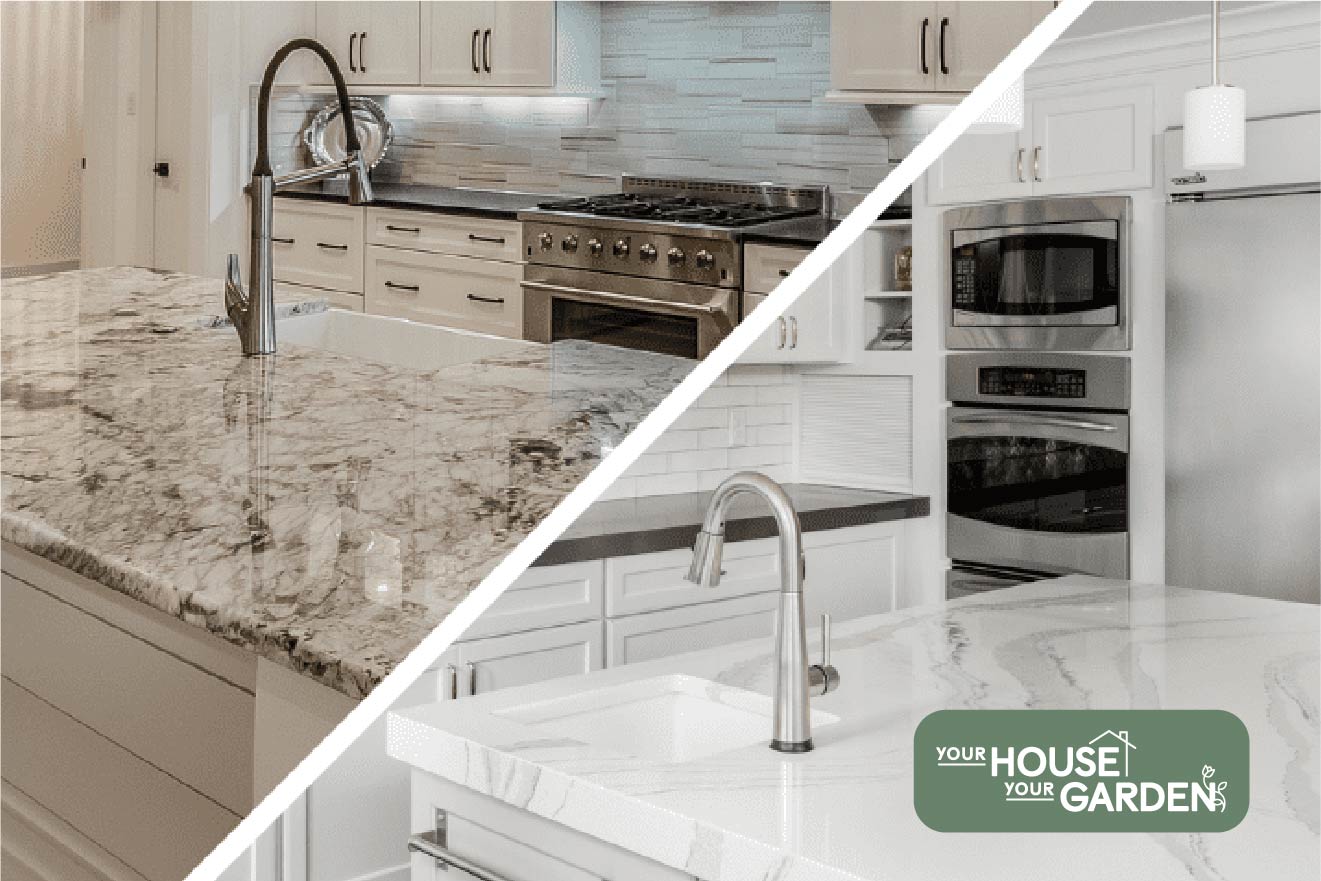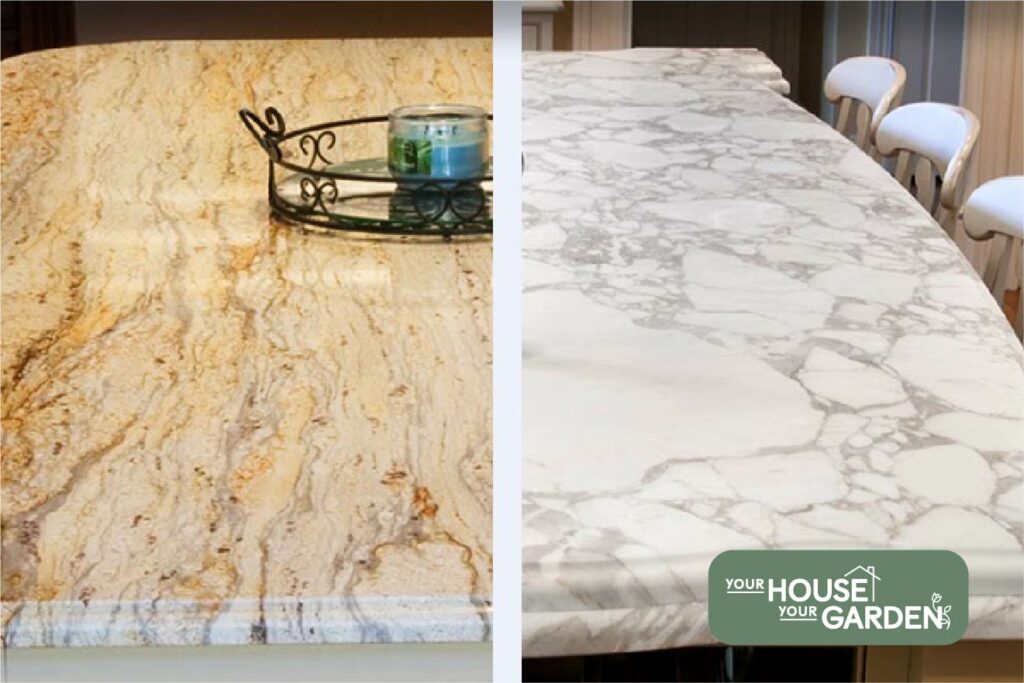Granite vs Marble Countertops
Home » Home Remodeling » Kitchen Countertops » Granite vs Marble Countertops
Just like the cabinets, light fixtures, or tile that your fireplace surrounds, choosing your countertops is an important decision to make. You have to take your budget, interior design preferences, and how a space is being utilized into consideration. For homeowners leaning more towards natural stone materials, granite and marble may be at the top of your list but you are not completely sure which countertop is best for you. Get to know both options better before making the final decision!
Granite vs Marble: The Difference
What is Granite?
Granite, an igneous rock, is formed when magma cools from its high heat and slowly solidifies into the natural stone. This countertop material, known for its hardness, is made out of feldspar, quartz, and other minerals that give the surface its natural beauty. Granite counters are made by quarrying the material and cutting it into granite slabs. The solid surface is then fitted onto bathroom vanities and kitchen counters.
What is Marble?
Marble is a metamorphic rock that is actually limestone that has undergone immense heat and pressure before becoming the highly sought-after material. Before the natural stone becomes kitchen and bathroom countertops, calcium carbonate is subject to high heat and pressure on the earth’s surface. After recrystallizing and becoming marble, the material is quarried like other natural stones, cut into slabs, and becomes familiar marble counters.

Pros and Cons
Before deciding between marble or granite, let’s get to know the materials a little better.
Granite Countertops: Pros
Maintainable: Generally speaking, a granite slab is great for everyday use. Busy kitchens and bathrooms can benefit from granite countertops because it is low-maintenance.
Valuable: Like other natural stone materials, granite has a higher value compared to its engineered counterparts (e.g., quartz countertops.) For homeowners looking for ways to elevate their kitchen environment and increase its value, granite is a counter to consider.
Durable: After being properly sealed, granite countertops are more heat-resistant, scratch-resistant, and stain-resistant. After sealing, this surface is also a wonderful addition to the sink in the bathroom or kitchen because it is more resistant to moisture and bacteria.
Can be Repaired: Many homeowners choose granite because the natural stone slab can be repaired when subject to intense heat or an accident occurs chipping and damaging the countertop.
Known for its Beauty: As a natural stone, granite countertops can complement different kitchen styles and its natural beauty will make a space look and feel more sophisticated.
Eco-friendly Countertop: Granite is a stone that is considered sustainable. As a material that can withstand scratches and does not stain easily after sealing, granite will not need to be replaced often and can even last a lifetime with proper maintenance. This countertop option is not mixed with any synthetic materials either.
Granite Countertops: Cons
Requires Sealing: Granite kitchen countertops require sealing in order to be more durable and take on daily wear and tear. This type of countertop should be sealed every year or every two years.
Heavy Material: As a stone that is quarried from the earth, granite is heavier than most countertop materials. That being said, a granite countertop will require more support in a kitchen or bathroom than glass would, for example.
Granite is Busy: Compared to quartz countertops, granite is a busy surface. Its natural patterns, veining, and mix of colors may make it hard for some owners to match the countertop with a specific accent piece in the bathroom or the custom kitchen cabinets already in place.
Limited Options: Unlike laminate or quartz, granite is a stone that has limited colorways because it is only found in certain areas around the world. If you are looking for a specific matte finish or color to easily be integrated into your current kitchen environment, the granite slabs available may not be what you are looking for.
Marble Countertops: Pros
As a Real Stone, Marble is Unique: Marble countertops are renowned for their uniqueness. No two square feet are the same even on the same slab.
Known for its Heat Resistance: Marble is also popular because it is heat-resistant. Marble can take on hot pans, heated appliances, and hot pots without being seriously damaged.
Adds Value: Marble, per square foot installed, increases the value of kitchens and bathrooms. This natural stone is the epitome of elegance which is why it is such a popular countertop and backsplash material.
Long-lasting: No matter what type you choose (e.g, Calacatta marble or Carrara marble), the countertop can last a lifetime with popper maintenance.
Marble Countertops: Cons
Will Need to be Sealed: Not only does marble need to be sealed, but it also requires regular sealing. This way, marble will be less prone to visible scratches and damage from acidic liquids.
Is an Investment: As one of the more expensive countertop materials on the market, marble is a hefty investment to make compared to engineered marble or quartz.
Affected by Acids: Acidic foods and liquids like lemon slices or tomato juice will cause etching to occur on the surface of a marble countertop.
Visible Grout Lines: Marble countertops, known for their unique veining patterns and colors, means that slabs and tiles have visible grout lines. For homeowners looking for a material that offers more cohesion, marble may not be your top pick.


Comparing the Two
Granite vs marble countertops: which one is the best for you? Comparing the two materials will help you decide what will best suit your interior design style.
Appearance
Granite and marble vary in color, speck patterns, and veining. Granite can be found in various shades of white, black, grey, blue, beige, and brown. On the other hand, marble is available in white, beige, grey, and black variations.
Granite vs marble countertops, granite has more visible grains due to its compressed mineral composition. On the other hand, veining patterns in marble are larger and more noticeable. Both granite and marble have unique colorways where you make the ultimate decision based on what will best suit your kitchens or bathrooms.
Durability
Both marble and granite are known for their hardness, however, granite is the harder material. Out of the two materials, granite is less prone to chipping and will not scratch as easily. Sealing increases both granite and marble’s durability however unlike granite, marble is vulnerable to acidic liquids and food.
Maintenance
Marble and granite, as porous materials, will need to be sealed occasionally. It is recommended to seal granite and marble every 1 year to 2 years. Taking care of the materials on a daily basis will consist of quickly wiping off spilled liquids and crumbs.
Prices
Marble and granite are on the more expensive side of the spectrum as natural materials. Marble can cost around $60 per square foot but will also cost as much as $200 per square foot. Granite is slightly more affordable at $40 to $100 per square foot.
Costs
Both granite and marble can be installed by professionals. However, experienced DIY homeowners can also install granite by themselves. Marble should not be installed by non-experts because of its weight and the fact that it is an expensive countertop.








